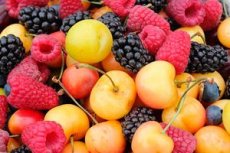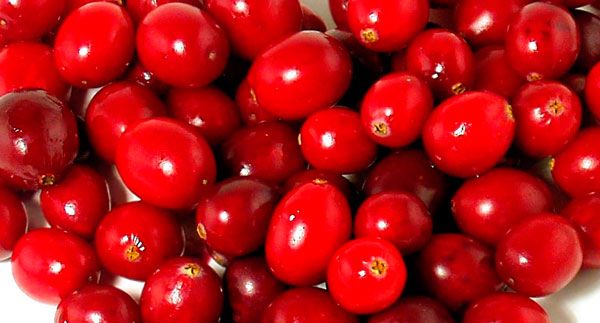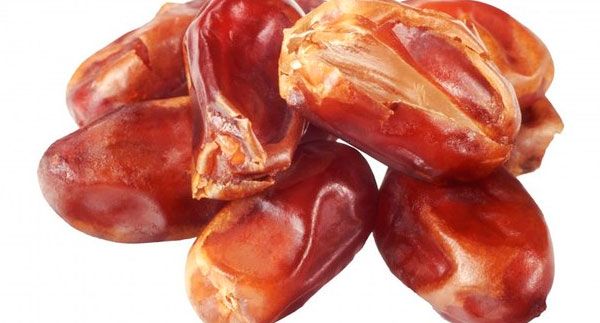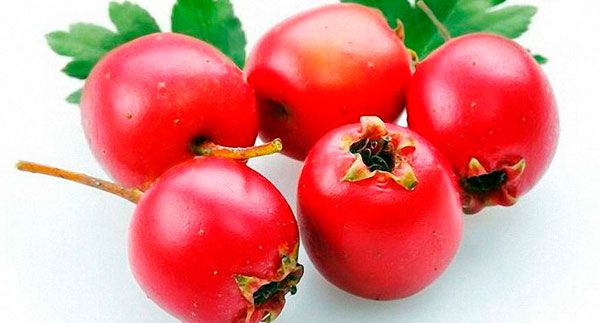Medical expert of the article
New publications
Berries in gastritis with hyperacidity
Last reviewed: 03.07.2025

All iLive content is medically reviewed or fact checked to ensure as much factual accuracy as possible.
We have strict sourcing guidelines and only link to reputable media sites, academic research institutions and, whenever possible, medically peer reviewed studies. Note that the numbers in parentheses ([1], [2], etc.) are clickable links to these studies.
If you feel that any of our content is inaccurate, out-of-date, or otherwise questionable, please select it and press Ctrl + Enter.

Fresh fruits and berries, as sources of natural vitamins, are always welcome on our table. It would seem, eat as much as you want and enjoy. But are juicy, sweet and sour fruits always beneficial? Is it possible to enjoy berries with gastritis with high acidity?
 [ 1 ]
[ 1 ]
Indications
Gastritis with high acidity manifests itself with a number of unpleasant symptoms, the main one being heartburn. It occurs because gastric juice enters the esophagus, causing a burning sensation on its mucous membrane. The discomfort is intensified by sour belching, which appears when the stomach is full.
Increased acidity is discussed when the specific gravity of hydrochloric acid in the stomach contents is equal to or exceeds 0.5%. Such an indicator requires treatment, and not only medication: diet plays an important role in gastritis therapy.
In case of acid gastritis, food that does not stimulate an increase in the pH of the stomach is recommended: boiled and mashed carrots, beets, potatoes, cauliflower, and, with some restrictions, other vegetables. Fermented, salted, pickled vegetables, all canned goods, as well as mushrooms, turnips, onions, cucumbers, cabbage, sorrel and spinach are prohibited. Spicy, fatty, fried foods are also excluded from the diet. The diet requires regular meals, without fasting or overeating.
Berries are usually called sweet, but this is often just a metaphor. In fact, most berries contain a lot of acids, which give them a pleasant sweet and sour, and sometimes even sour taste. Does the stomach need this, which already suffers from an excess of acid?
It turns out that you shouldn't completely give up berries when you have gastritis with high acidity. You just need to choose and eat berries correctly. They should be:
- not sour;
- ripe;
- good quality.
You should eat:
- not on an empty stomach;
- in moderation;
- between main meals;
- chewing thoroughly.
Fortunately, there is a sufficient choice of these fruits to suit every taste, especially in summer. At other times, fruit and berry juices, pastilles, dried fruits, marshmallows, homemade jams and berry preserves are allowed.
After a berry snack, it is not advisable to lie down for about an hour, so as not to provoke heartburn from gastric juice entering the esophagus.
In a diet for high acidity, it is important to control the temperature of food and the saturation with vitamin C. There should be no thermal or chemical irritants in food. This also applies to berries for gastritis with high acidity: they should be eaten grated, without skin and seeds, at a neutral temperature. Of course, choose only sweet fruits; mixing two different types of berries is allowed.
The most useful are considered to be berry and fruit jellies, compotes, puddings and other desserts.
Benefits
In hyperacid gastritis, a diet is prescribed that does not allow mechanical irritation of the gastric mucosa. Such a menu is known as diet No. 1. What place is given to berries in the diet for gastritis with high acidity?
The real benefit of berries for gastritis with high acidity significantly exceeds the possible harm. Fresh berries contain various vitamins, organic acids, essential oils, microelements. All these substances in reasonable doses are necessary for every organism.
Harm can only be discussed if berries are abused. It can manifest itself in the following consequences:
- excessive doses have a negative effect on digestive processes;
- The abundance of organic acids corrodes tooth enamel.
 [ 2 ]
[ 2 ]
What can and what can not?
To avoid negative effects, fruits and berries for gastritis should be pre-prepared: mashed, baked, boiled, made into puree, jelly, mousse, jellies, compotes, jams.
Watermelon
Watermelon is one of the few berries that are allowed for any gastritis, provided that they are ripe and grown using environmentally friendly technologies. The juice of watermelon saturates the body with natural sugar, cleanses it of toxins and excess fluid. Fiber stimulates the intestines, "sweeping out" accumulations of food residues.
However, doctors warn against consuming excessive portions of this berry, which is unlike all others, and recommend using... watermelon rinds. That is, they consider watermelon as a berry for gastritis with high acidity not a food product, but a medicine.
- The remedy is prepared in the following way: the dried crusts are crushed and poured with boiling water (10 tablespoons per 1 liter of water). Drink warm on an empty stomach, one glass at a time, half an hour before breakfast.
Watermelon is contraindicated in cases of kidney stones, diabetes, pancreatitis, prostate adenoma, colitis, and postoperative adhesions.
Cranberry
Cranberries are one of the most popular berries; they attract attention due to their unique properties, which are still being studied by pharmacists and nutritionists. Cranberries contain:
- antioxidants;
- glucose and fructose;
- organic acids;
- pectins;
- tanning components;
- vitamins;
- microelements.
Cranberries and their processed products are used as a vitamin, antipyretic, diuretic, antibacterial, thirst-quenching, and general tonic. In the old days, cranberries were used to combat scurvy, and today they note the positive effect of cranberries in the treatment of antibiotics: the berry or juice from it enhances the effectiveness of these medications.

Among other organic acids, cranberries contain benzoic acid, which has the qualities of a natural preservative. Due to this, the berries do not require special processing. Another feature of cranberries is the optimal balance and absorption of useful components.
Unfortunately, such a useful berry is contraindicated for gastritis with high acidity. Cranberries are also not recommended for intestinal ulcers and liver problems. Cranberries also have a negative effect on tooth enamel, although they have a strengthening effect on gums.
Dates
Dates are considered heavy food. They are also called "desert bread". These are healthy fruits, as they contain proteins, fats, carbohydrates, oils, pectins, a dozen and a half minerals and vitamins. Dates are consumed dried, used in compotes, pastries, salads and other culinary recipes. In their pure form, dried fruits are recommended to be eaten 15 minutes before a meal, while a single portion should not exceed 50 g.

There are conflicting opinions regarding the use of these berries for gastritis.
- Thus, some experts categorically oppose this product in the diet of people with acute and chronic forms of gastritis, because the abundance of plant fibers in these fruits provokes an exacerbation of the disease.
- Others consider it acceptable to consume only dried dates for all types of gastritis.
- Another recommendation: dates are allowed in the menu for dessert in case of gastritis with high acidity, in limited quantities.
This disagreement indicates one thing: each patient should decide individually how to treat dates and act in accordance with the doctor's recommendations and well-being. It should be taken into account that dates contain a lot of sugar. Therefore, they are not recommended for people with diabetes and excess weight - as well as figs, grapes, bananas, sweet plums.
Viburnum
The bitter taste of viburnum makes it not the most favorite berry, but does not diminish the medicinal properties of these fruits. In recognizing viburnum as a storehouse of useful properties, both folk healers and professional doctors agree. Moreover, not only the fruits are considered medicinal, but also the bark of viburnum, which has healing, hemostatic, antispasmodic properties.
The bitter berry is rich in sugar, vitamin C, a number of organic acids and antioxidants.
- Viburnum acts as an anticonvulsant, choleretic, and anti-inflammatory agent.
- An infusion of the fruits calms nerves and coughs.
- The berry strengthens the heart and blood vessels and removes excess fluid from the body.
- There is information that viburnum is effective in cancer prevention.
Juice and fruit drink from the berry for gastritis with high acidity, as well as for peptic ulcer disease, is considered an effective folk remedy.
Fresh and processed viburnum is not useful for everyone. It can be harmful during pregnancy and for those suffering from gout and kidneys, as well as for blood clotting disorders that threaten thrombosis.
Raspberry
Raspberry is a popular berry, long used for food and medicinal purposes. Contains fiber, alcohols, essential oils, coumarin, a complex of vitamins and minerals. Used fresh, dried, frozen, as an ingredient in fruit salads, jam, jelly, marmalade.
- The taste and healing qualities of the berry are successfully used by pharmacists, confectioners, winemakers and tea producers. Traditional medicine considers it the number one medicine for colds, high temperature, joint pain. Red, yellow, black varieties of raspberries are useful for hypertension, anemia, atherosclerosis, anorexia, gynecological and other problems.
The disadvantages include allergenicity, the presence of purines and acids in raspberries. It is the latter property that makes the miracle berry unacceptable for gastritis with high acidity, as well as for some kidney diseases and gout.
In addition, raspberries contain small seeds that are almost impossible to remove from the fruit and can irritate the stomach. This is another contraindication that makes the "sweet berry" undesirable for gastritis with high acidity.
Patients with gastritis can feel the raspberry taste by drinking raspberry juice, which, like cherry juice, reduces gastric secretion. The main thing is that it is fresh, and not store-bought liquid with citric and other acids, which are harmful for acid gastritis.
Cowberry
Lingonberry is called a magic berry - primarily due to its unique composition. Pectin, carotene, vitamins A, B, E, C, flavonoids and phytoncides, fructose and microelements make the berry incredibly useful, and the aroma and taste - an excellent natural delicacy. For hundreds of years, people have used lingonberries to make fruit drinks, jam, kissels, because heat treatment does not destroy most of the beneficial qualities of the bright red berry.
Lingonberries are well absorbed by the body, with regular use they:
- improves the condition of skin and hair;
- promotes weight loss;
- strengthens the body's defenses;
- relieves depression;
- cures tuberculosis, anemia, gastritis.
Lingonberry is recommended for diabetes, swelling, and for the prevention of heart attacks. Lingonberry juice has antiseptic properties, which is used in the treatment of colds and some gastrointestinal pathologies. In combination with honey, it serves to strengthen the immune system.
Lingonberry juice and berries can be harmful for gastritis with high acidity, so their use is not recommended for such patients, especially if they have ulcers. Lingonberry is also contraindicated for hypotensive patients, as it can lower blood pressure.
Hawthorn
Hawthorn stands out among other berries with its large, bright red fruits, which decorate the bushes of the wild plant in clusters. In the fall, they are collected by people who know a lot about folk medicine. After all, hawthorn tincture is one of the most popular pharmacy drugs "for the heart", and decoctions from the fruits are an excellent home remedy.
Another special feature of hawthorn is that it goes well with medicinal herbs, other fruits (for example, rose hips), and honey.
The fruits are rich in the following substances:
- vitamins A, C, beta-carotene;
- potassium, calcium, iron, magnesium, manganese;
- pectins.
The action of hawthorn is varied; it removes excess fluid along with toxins, lowers blood pressure, sugar and cholesterol levels, improves attention and memory, treats inflammation and colds.

Low calorie content and rich chemical composition make hawthorn interesting for those who want to lose weight, and the combination with other components allows it to be used as an additional remedy against disorders in the heart, nervous system and blood pressure. Its berries also have a therapeutic effect for gastritis with high acidity. The recipe for the medicine is simple: the berries are thrown into boiling water and cooked like compote. For abdominal pain, it is recommended to eat the boiled fruits with tea.
Contraindications
A patient with gastritis has to give up some pleasures, including eating fresh gifts of nature. Thus, you cannot eat unprocessed fruits and berries with gastritis with high acidity: cherries, sweet cherries, sea buckthorn, apples, apricots and peaches on an empty stomach, pomegranates, oranges, lemons, strawberries, raspberries, currants, grapes, especially with the skin. The ban is due to the fact that sour berries can provoke an exacerbation of the chronic process.
Moreover, there are contraindications for exacerbation of any pathologies of the digestive organs: fruits and berries in their natural form cannot be eaten in this condition. Some fruits are allowed only in the form of puree, jelly, pastille, baked or boiled desserts.
During the period of remission of the disease, dried fruits are allowed, but not dates, dried apricots, raisins in raw form. You can cook compotes from them and drink them warm, but, according to nutritionists, such a drink will bring more benefit in case of hypoacid gastritis.
Fruits containing a lot of sugar (grapes, dates, bananas, figs) are contraindicated for diabetics and overweight people.
Possible risks
Harm from berries in gastritis with high acidity occurs when consuming sour fresh fruits, which increase acidity and irritate the gastric mucosa.
To avoid a negative effect, fruits and berries for gastritis with high acidity should be pre-prepared: mashed, baked, boiled, made into puree, jelly, mousse, jelly, compote.
During an exacerbation of the disease, raw berries and juices cannot be eaten. Outside of exacerbations, they are good for the intestines.
 [ 6 ]
[ 6 ]
Berries for gastritis with high acidity have a place in the menu - if the patient does not have other digestive problems. But if the body does not respond adequately to the use of berries, then the patient needs to undergo an examination to determine the cause of such a reaction. Perhaps, additional consultation with a specialist regarding treatment or nutrition will be required. In order not to deny yourself the use of such wonderful products as fruits and berries.

